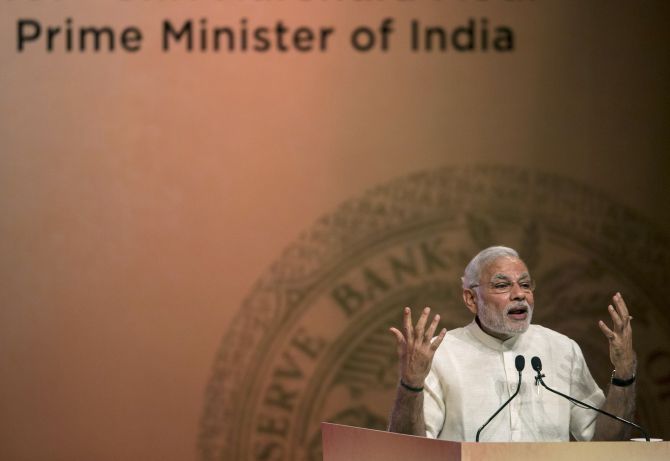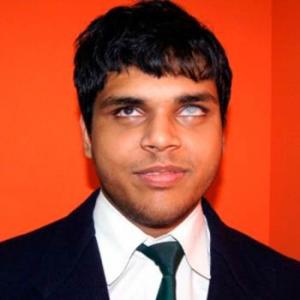
Prime Minister Narendra Modi speaks during an event on financial inclusion in Mumbai. Photograph: Danish Siddiqui/ Reuters
Meaningful devolution of spending power to states could spread more confidence on the ground and stir precisely the sort of change Prime Minister Narendra Modi had promised the voters during the election campaign, says Adam Roberts
With a few exceptions, Prime Minister Narendra Modi’s team of ministers has disappointed. He should bring in more talent before more time is lost, perhaps from the business world
You don’t have to like everything about Modi to admire some of what he is trying to do. He campaigned in the 2014 elections mostly by promising to bring “good times”. Press him on what that means and he talks of cutting poverty, creating jobs, building roads and getting the economy moving faster. These are welcome goals, though he should be far more ambitious in spelling out the reforms he expects to produce them. On some issues he speaks frankly and well. I have been impressed by his speeches on public hygiene, ending open defecation, generating respect for women and girls and more. His follow-up, however, has been less convincing.
In the year since thousands of us sat in the sunshine at Rashtrapati Bhavan and watched his inauguration, I have roamed about and asked others what they make of him. Recently in Ahmedabad and in Vadnagar, I heard Gujaratis say their former chief minister was behaving in some familiar ways, centralising power in himself, sidelining others who might have made a stronger team. In Kashmir, Karnataka, Andhra Pradesh and the Andaman Islands, I sought out those beyond the Hindi heartland. Perhaps unsurprisingly, the fervour for Modi is lower in such places than in the West and North.
In an interview with Chandrababu Naidu, in Hyderabad, I traced parallels between Modi’s political fortunes and those of other regional leaders with national interests. In Varanasi, I listened to Modi’s constituents grumble that their MP had so far brought no noticeable changes there: The river Ganges was no cleaner; there was no sign there of “achhe din”. Small businessmen and farmers are notably glum in many places, and routinely told me that they could not believe claims of statisticians that the economy was growing by 7.5 per cent a year. However, in visits to Pakistan, Nepal and Sri Lanka, I have heard foreigners who are impressed: They see renewed confidence, a spring in India’s step under Modi.
During 70-odd interviews for a just-completed special report on India, published in The Economist on May 23, I interviewed senior figures in politics, business and the bureaucracy. By and large people are yet willing to give him the benefit of the doubt, believing he could come right on the economy if only domestic investment picks up again. But there is also general disappointment that two Budgets have brought only half-hearted economic reforms. It is troubling that the one really big change expected -- the Goods and Services Tax -- looks stuck in Parliament.
Maybe meaningful devolution of spending power to states could spread more confidence on the ground. But I doubt Modi has yet done anything close to enough to count as a transformative figure on the economy. He is not obviously yet a liberaliser who believes in a smaller state, though he might be a moderniser who wants a more capable one. He believes technology can improve government, and he wants to shift to cash welfare, not subsidies in kind. Coal auctions were done well. These are welcome. But he has made little effort to open up for the market to do more in India, for example by recapitalising state banks and planning to make them independent of meddling.
With a few exceptions, his team of ministers has disappointed. Spending time with a factory manager in Rajasthan, I was told that nothing new had happened in the past year to make it easier to flourish in business, let alone to hire more people. The finance ministry’s mess-up of retrospective and other tax is turning out to be the main flop. Modi should bring in more talent before more time is lost, perhaps from the business world. Arun Shourie’s attack that his government is “directionless” was well-placed. Arun Jaitley may be an important minister but it looks increasingly like he runs the wrong ministry.
Many who supported Modi while hoping for a strong economy understood he also had an illiberal, at times intolerant, side. If the economic story could have been brighter, what about the recent record on social matters? Here Modi is a letdown: He has failed to grab all chances to prove himself a tolerant leader of all Indians. In Kashmir, I heard, to my surprise, that many people were ready to give him a chance to see if he could prove himself as a capable leader. But such tolerance will fade if he fails to clearly disavow Hindu nationalists set on dividing Indians.
Modi should speak out frequently and clearly against religious and other intolerance. Campaigns to “reconvert” non-Hindus to Hinduism and comments by the Rashtriya Swayamsevak Sangh chief Mohan Bhagwat that all who reside in Hindustan are Hindus look intended to marginalise or worry non-Hindus. Modi should openly reject such statements. It is not enough to do so in private. He should also have sacked Niranjan Jyoti, his junior minister for food processing, who called non-Hindus “bastards”. Not doing so has diminished his own reputation at home and abroad.
Also troubling is his intolerance of non-governmental groups, such as the Ford Foundation and Greenpeace. The US’ ambassador to India, Richard Verma, was right to say the current crackdowns on NGOs had “chilling effects” on Indian democracy.
A first year in office should be for building up momentum, setting up a strong team, taking difficult early decisions to bring substantial benefits later. On these scores Modi’s record is mixed. In a last area, foreign policy, he has proved energetic and impressive, but that counts for relatively little for most people.
Adam Roberts is based in Delhi, as South Asia bureau chief of The Economist. He tweets as @Arobertsjourno











